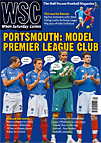 Taylor Parkes sits through a British comedy about Gillingham fans on a road trip
Taylor Parkes sits through a British comedy about Gillingham fans on a road trip
Pre-release publicity for The Shouting Men makes much of the fact that despite being a football film, it’s not about football violence – well, that’s something I suppose. It is, however, about beery laughs and mawkish sentiment, which is surely the next worst thing. Gillingham are drawn away to Newcastle in the Cup; a mismatched band of Gills fanatics make the trip in a clapped-out minibus, with much calamity along the way. Into this hollow shell of a plot almost any kind of comedy could have been poured, but a slack script, some non-performances and too much soapy slop make this a pretty trying experience.
The main problem with this film – apart from just not being very funny – is that it aims too low and too high, at once. The jokes themselves are mostly pretty cheap (fat people eat a lot, old people shagging is disgusting, bodily functions are intrinsically funny and fans of small clubs are amiable, madly obsessive saddos). But then there’s all this emotional stuff.
It’s an unfortunate trend that’s crept into British comedy since The Office – it’s not enough to make your audience laugh, you have to have a bit of boo-hoo, too. This is notoriously hard to get right, though, and can fox the most experienced writers (ask anyone who cringed through those Only Fools And Horses Christmas specials). So the characters here are forced on some contrived “emotional journey”. It’s just impossible to care because it’s handled so clumsily and because they’re only paper cut-outs in the first place. One minute you’re supposed to laugh at someone breaking wind in a minibus, the next you’re meant to blub at the most base emotional manipulation. A few more gags, even more bad ones, would have been the wiser choice.
There’s something inoperably wrong with any comedy whose funniest moment is a John Barnes cameo, but Barnes is actually pretty good here (totally natural on camera, for once) and his deadpan self-mockery does raise the film’s one real laugh. Interesting, too, to see a bloke in a wheelchair portrayed as an utterly appalling wanker. Since the actor in the chair co-wrote the script, I assumed this must have been born of personal frustration at being patronised – but it turns out that in real life he’s not in a wheelchair at all. Still, it makes a change from most modern comedy, where disabled characters only exist to look embarrassed when someone able-bodied says something “inappropriate”.
Unusually for a bad new comedy, you don’t end up hating the people who made it. There’s not a trace of smugness in this film, it’s in no way mean-spirited and is, on that level, almost likeable. It’s just so terribly unfunny and so hopelessly ham-fisted when trying to transcend its natural limitations. It tells us nothing about football, or football fans, or life, and won’t amuse anyone who doesn’t laugh at T-shirt slogans. I’m told it was conceived as an ITV sitcom; sadly, it shows.
From WSC 278 April 2010